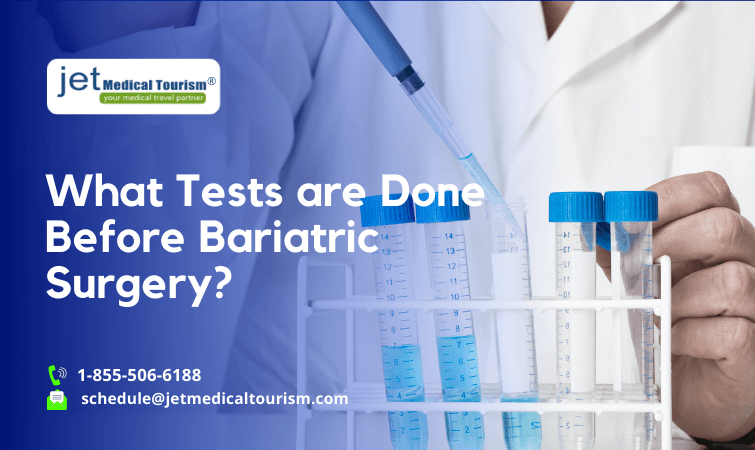Should I Get Weight Loss Surgery?

When you are fighting an uphill battle against obesity, it is easy to get caught in self-doubt. Even if you are a clear candidate for a bariatric procedure, you might still ask: “Should I get weight loss surgery?” This kind of worry and uncertainty is normal because going under the knife is never an easy decision. It is best to make a consultation appointment with an experienced surgeon and ask them upfront: “Should I have weight loss surgery?”
Contact Jet Medical Tourism® today.
Do I need weight loss surgery
It may surprise you to know that in any given year, only about one percent of obesity patients who qualify for bariatric surgery actually have it. This startling data is reported by none other than the American Society of Metabolic and Bariatric Surgery (ASMBS) itself. Therefore, if you are struggling with obesity and you ask: “Do I need weight loss surgery,” the answer is most likely yes!
Obesity is persistent in absence of surgery
The same ASMBS report also says that once you have crossed the standard obesity threshold (BMI > 35), the possibility of returning to a normal body weight in a sustainable manner without surgery is less than one percent. Therefore, when a patient with BMI in excess of 35 asks, “Should I get weight loss surgery,” the answer is almost always yes!
Non-invasive weight loss techniques don’t work
Millions of people try non-surgical methods, such as diet, exercise, or pills to get rid of obesity. Unfortunately, only a few meet success through these methods. And even among those who do, a majority of them end up regaining all the weight they had lost. So, if your question is, “Do I need weight loss surgery,” you probably do if you want to overcome obesity.
Why get weight loss surgery
During your first appointment for weight loss surgery, a dedicated bariatric surgeon will explain to you its pros and cons. They will discuss why and how to get weight loss surgery, and whether you are fit candidate who can benefit from it. If you qualify as a candidate, but still have lingering doubts about should I get weight loss surgery or not, you should look at the bright side of this procedure.
- A bariatric surgery will not only provide you freedom from obesity, it will also restore your health by reducing or resolving co-morbidities.
- People with obesity who ask why get weight loss surgery should know that this one-time procedure can significantly improve longevity.
- Weight loss surgery will reduce your lifelong dependence on medications and keep you free of their long-term side effects.
- If you are wondering, “Should I have weight loss surgery,” be sure that this procedure could dramatically improve your aesthetic looks.
- A bariatric surgery will let you wear the clothes you want, participate in sports and outdoor activities, and boost your overall quality of life.
- Improvement in your self-esteem and self-confidence could have
- If cost is concern that makes you wonder, “Should I get weight loss surgery,” be aware that your annual healthcare costs will reduce.
RELATED: Pros and cons of weight loss surgery
When to get weight loss surgery
Many people are overweight or suffer from obesity, but not everyone is a good candidate for bariatric surgery. For your own safety, you should know when to get weight loss surgery and follow the professional advice of your surgeon. It is not enough to ask should I have weight loss surgery. It is more important to know when to have it.
- Body mass index: Your body mass index (BMI) is the foremost criterion that will determine when to get weight loss surgery. In general, people with a BMI of 40 or above should undergo a bariatric procedure at the first available opportunity.
- Co-morbidities: If you suffer from obesity related medical conditions, such as diabetes, hypertension, or sleep apnea, you should ask your surgeon do I need weight loss surgery. Generally, people with a BMI of 35 or above with co-morbidities will qualify for this surgery.
- Special cases: If your BMI is 30+ with co-morbidities, or you are below the age of 18 but have severe obesity, your surgeon will recommend to you when you should sign up for weight loss surgery. In special situations, the broad guidelines can be adjusted if the patient will benefit from the surgery.
RELATED: Bariatric surgery requirements: Do I qualify for weight loss surgery?
Should I get gastric sleeve
Gastric sleeve is currently the most preferred form of bariatric surgery. However, it’s critical to ask should I have gastric sleeve or another bariatric procedure. Your bariatric surgeon is the best person to judge whether you are more suited for a sleeve gastrectomy. Here are some of the conditions that will determine if this procedure is the right choice.
- If your BMI is 35 or above with co-morbidities or the BMI is 40+ without co-morbidities, ask your surgeon do I need gastric sleeve?
- Share your medical history with your surgeon to determine whether you have pre-existing conditions that disqualify you for gastric sleeve.
- Assess whether you are willing to accept the fact that a gastric sleeve is irreversible, so the changes to your anatomy will be permanent.
- When you are considering should I get gastric sleeve surgery, be prepared to commit yourself to a post-op VSG diet for a lifetime for best results.
- You may have to undergo a non-invasive weight loss program prior to your gastric sleeve, especially if you are seeking insurance coverage.
READ THIS: Gastric sleeve requirements: Do I qualify for it?
Can I get gastric bypass
Gastric bypass is the oldest and most reliable form of bariatric surgery for people who want to achieve rapid and sustainable weight loss. However, this procedure is not for everyone and you must ask your surgeon can I get gastric bypass? Here are some of the circumstances to consider when you are thinking of getting a gastric bypass surgery.
- If your BMI is 35 or above with co-morbidities or the BMI is 40+ without co-morbidities, ask your surgeon do I need gastric bypass?
- If you have obesity related type 2 diabetes, it’s more pertinent to consider should I get gastric bypass because of its efficacy.
- Let your surgeon evaluate your fitness for this surgery because it is more invasive and will involve changes to your small intestine.
- While you are evaluating should I have gastric bypass, check if you are committed to taking nutrition supplements lifelong post-surgery.
- Your surgeon may want to assess your emotional health, apart from physical health when you ask should I get gastric bypass surgery.
RELATED: Gastric bypass requirements: Am I a good candidate for it?
Reasons not to have bariatric surgery
When you ask your bariatric surgeon, “Should I get weight loss surgery,” it is possible sometimes that their answer may be “No.” Under certain conditions, you may not qualify for this procedure. Here are some of the reasons not to have bariatric surgery:
- Based on your BMI, your surgeon may classify you as overweight but not morbidly obese, and suggest non-surgical weight loss options.
- You suffer from certain serious medical condition, as a result of which your risk of surgery outweighs the potential health benefits.
- You have not made any previous attempt to lose weight non-invasively, which may be a reason not to have bariatric surgery.
- You are using NSAIDs or blood thinners or other drugs, which cannot be stopped temporarily and will increase the risk of blood clots.
- You are unwilling or unable to quit smoking for a few weeks, which could become one of the reasons not to have bariatric surgery.
- Your surgeon determines that you are under-age or over-age, or you are unable to commit to a pre- and post-op prescribed diet plan.
READ THIS TOO: Bariatric surgery guidelines you must know
First appointment for weight loss surgery: What to expect?
The first appointment for weight loss surgery is often the most important. At this appointment, your surgeon will educate you about all aspects of the procedure and address your questions and concerns. You must ask should I get weight loss surgery, and if yes, when to get weight loss surgery. Your surgeon will determine your candidacy, and help you make a well-informed choice. Talk to a reliable medical tourism provider today to set up your first appointment for weight loss surgery.




